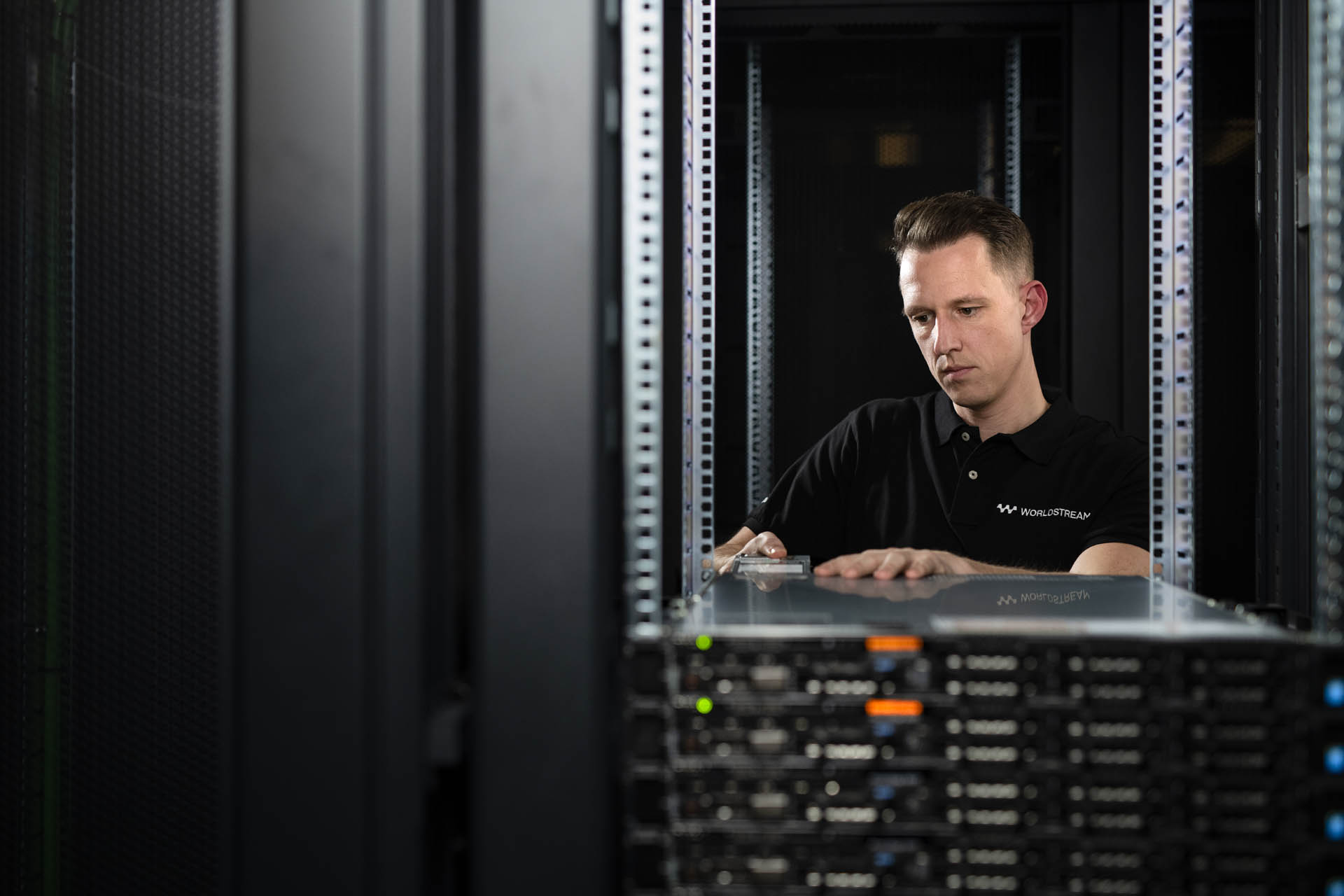Applications and Benefits of Utilizing NVMe SSDs for Dedicated Servers
As the data usage of organizations continues to expand, NVMe (Non-Volatile Memory Express) SSDs are emerging as the preferred solution for increasing I/O (input/output) speeds and reducing latency in dedicated server configurations. Worldstream offers various dedicated server setups with NVMe SSD, a great technology that provides superior server performance.

For our dedicated server clients, Non-Volatile Memory Express technology is capable to fundamentally change the dynamics of data transfer between CPUs and storage components. Data transfer speeds are greatly increased by NVMe drives compared to traditional SATA SSDs because of its more efficient bus design and protocol. This improvement allows for greatly reduced latency times and significantly speeding up server operations, making NVMe SSDs a very attractive option for businesses looking to get the most out of their IT infrastructure.
Solid-state drive performance is significantly optimized with NVMe SSD technology. With thousands of command queues supported and massive amounts of data communication possible, NVMe SSDs outperform SATA counterparts as well as conventional hard disk drives (HDDs). NVMe SSDs are therefore especially useful for dedicated servers on which high-speed, low-latency applications like database administration and large-scale data analytics are deployed, although any application would gain from their quick delivery capabilities and excellent user experience as a result.
Enhanced IOPS
The primary benefit of integrating NVMe SSDs into a dedicated server configuration is the enhanced input/output (I/O) performance. When it comes to applications that demand frequent access to the disk, IOPS can be a crucial factor to consider. When NVMe SSDs are compared to traditional storage choices, it becomes evident that NVMe SSDs offer significantly faster read and write speeds. For handling labor-intensive tasks, such as with databases, where fast access to and processing of data is required, this speed boost can be crucial. Additionally, NVMe technology reduces the amount of work that the CPU must perform to handle several I/O requests at once, freeing up critical computing resources for other critical tasks on a dedicated server.
In addition, NVMe solid-state drives contribute to the scalability of IT infrastructure. As this technology allows for a high level of concurrency, NVMe provides faster and larger capacity storage to meet the demands of growing workloads without requiring the addition of more storage components. Due to the high level of concurrency that NVMe offers, it’s also well-suited for server cluster configurations.
Another significant advantage of using NVMe SSDs in a dedicated server configuration is its capacity to lower latency. Because of the reduced latency, users may have better experiences as they can access data more quickly while applications show better performance. Although ultra-low latency is especially important for industries that depend on fast data access, such as financial services and online transaction processing, it can benefit any business application where the user experience matters.
Moreover, NVMe SSDs are capable of handling enormous amounts of data effectively because of their increased throughput compared to the traditional storage protocols. For big data applications and data analytics, which need the rapid processing and analysis of massive amounts of data, SSDs can thus be an excellent option.
Critical in High-Performance Server Settings
As said, NVMe SSD can be an interesting dedicated server configuration choice for any business application, but especially in a number of high-performance environments it can be critical:
Databases - Improving efficiency and cutting down on query response times is essential for high-performance databases.
Virtualization - Supporting multiple virtual machines on a single server by increasing I/O performance, lowering latency, and minimizing CPU overhead.
Cloud Computing - Boosting productivity and performance in situations where scalability counts.
Big Data - To enable faster data management, large datasets must be processed quickly which NVMe SSDs can provide.
High-Performance Computing (HPC) - Offering fast data transmission speeds to improve efficiency on computationally demanding tasks.
Content Delivery Networks (CDNs) - Enhancing the user experience by using NVMe SSD and expediting the delivery and availability of multimedia content.
Edge Computing - Lowering latency by improving data processing capabilities at the edge of networks.
NVMe SSD can be added to a number of turnkey dedicated server configurations that Worldstream offers, with lightning-fast delivery times, or it can be integrated into a fully customized server. If required, Worldstream Sales Support can offer advice on this.
Dedicated Servers Offered by Worldstream
Founded in 2006 by childhood friends who shared a passion for gaming, Worldstream has evolved into an international IT infrastructure (IaaS) provider. Our mission is to create the ultimate digital experience together with you and our partners.
We advise, design, and provide advanced infrastructure solutions, offering peace of mind to IT leaders at tech companies. With a commitment to high-quality infrastructure, industry-leading service, and strong partnerships, we simplify IT leaders' lives and provide round-the-clock 24/7 support.
Worldstream offers dedicated servers in two varieties: fully customizable servers and fixed instant delivery server setups. We currently have more than 15,000 dedicated servers installed for our clients in Worldstream’s data centers. These dedicated servers are backed by Worldstream’s proprietary global network. Every dedicated server includes 40 Gbit/s anti-DDoS, which is also upgradeable. Due to the maximum bandwidth consumption of only 45% on Worldstream's netwerk, server users have optimal scalability and DDoS defense guarantees.
You might also like:
- How to deliver any IT functionality As-a-Service.
- The difference between Bare Metal Cloud and Dedicated Servers.
- What are your options against a growing number of DDoS attacks?
Have a question for the editor of this article? You can reach us here.